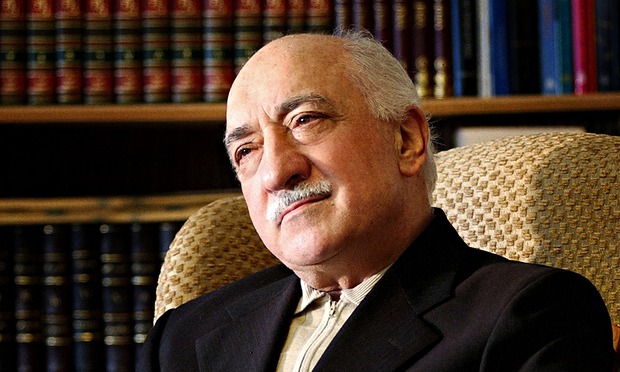Turkey issues arrest warrant for Erdoğan rival Fethullah Gülen

A Turkish court has issued an arrest warrant for the US-based Islamic cleric Fethullah Gülen, a former ally of Turkish president Recep Tayyip Erdoğan who has since become a fierce critic.
In his request for the warrant, Istanbul public prosecutor Hasan Yilmaz accused Gülen of leading a criminal organisation. According to Turkish media reports, the charges include operating an armed terror group, which carries a penalty of up to 15 years in prison. Yilmaz said that “sufficient tangible evidence showing that Gülen committed a crime was collected during the investigation”.
Turkish authorities are now able to apply to Washington for extradition of the elderly cleric, though such a request is likely to put strained relations with Turkey’s Nato ally under further pressure.
Following a string of orchestrated raids on media outlets with ties to the cleric last Sunday, the warrant marks another escalation in the battle between Erdoğan and Gülen, whose movement, also known as Hizmet, has millions of followers worldwide.
Erdoğan has accused his foe of establishing a “parallel structure” within the state by placing his followers in institutions such as the judiciary and the police, and of exerting strong influence through his media empire. Gülen denies any intent to overthrow Erdoğan or the Turkish government.
The European Union has strongly condemned the raids, which Erdoğan defended as a necessary response to “dirty operations” against the Turkish government.
Speaking at the opening of an extension to an oil refinery near Istanbul, Erdoğan told his EU critics to mind their own business: “We have no concern about what the EU might say, whether the EU accepts us as members or not, we have no such concern. Please keep your wisdom to yourself,” he said.
EU enlargement commissioner Johannes Hahn described the police operation as “not really an invitation to move further forward” with Turkey. The US State Department has also expressed concern, urging Turkish authorities “to ensure their actions do not violate [the] core values [media freedom, due process, and judicial independence]”.
On Friday, a Turkish court also kept a media executive and three other people detained during Sunday’s raids in custody pending trial, all of them on charges of being members of a terrorist group.
Hidayet Karaca is the head of the Samanyolu Broadcasting Group, a media organisation known to have close ties to the Gülen movement. Ekrem Dumanli, editor-in-chief of the Zaman newspaper also linked to Gülen, was released pending trial, but forbidden from travelling abroad before the completion of the criminal investigation.
Human rights groups criticised the court’s decision. “Human Rights Watch is concerned at today’s court decision to place journalist and Samanyolu broadcasting group head, Hidayet Karaca, in pre-trial detention,” said Emma Sinclair-Webb, HRW’s senior Turkey researcher. “Pre-trial detention should be the exception, and keeping journalists in custody on dubious terrorism charges without clear justification harms media freedom and is likely to further dent Turkey’s international reputation.”
The power and influence of the elderly cleric and his far-reaching network have long been a defining issue of Turkish politics. The domination of Erdoğan’s AKP in Turkey was aided by his alliance with Gülen, who has lived in self-imposed exile in Pennsylvania since 1998. Those who dared to speak up and criticise the Gülen movement were swiftly punished, often through dubious court cases and on fabricated charges.
The relationship between the two turned sour after a corruption scandal in December last year that implicated the government, Erdoğan’s closest associates and his family. Maintaining that the sleaze allegations were unfounded and part of a coup attempt led by Gülen, Erdoğan purged the police of thousands of officers, transferred prosecutors linked to the investigation and tightened control over the judiciary. Prosecutors dropped the corruption charges this year.
Erdoğan said that both the operations and the purges of state institutions would continue, and added that the judiciary and some others, including the state scientific agency Tubitak, must yet be “cleansed of all traitors”.